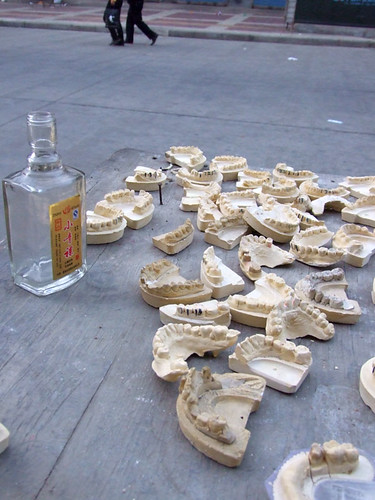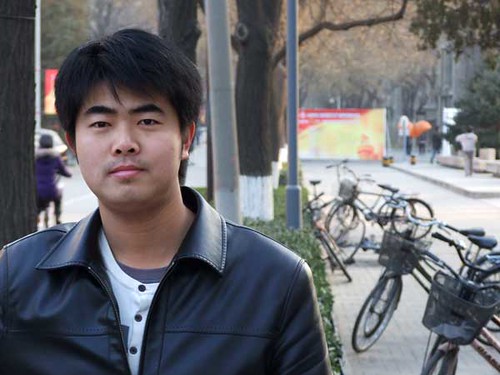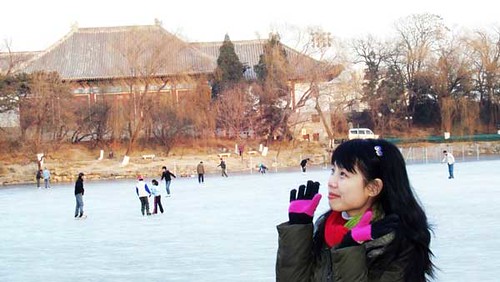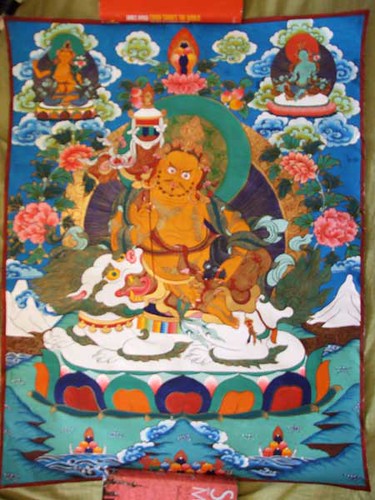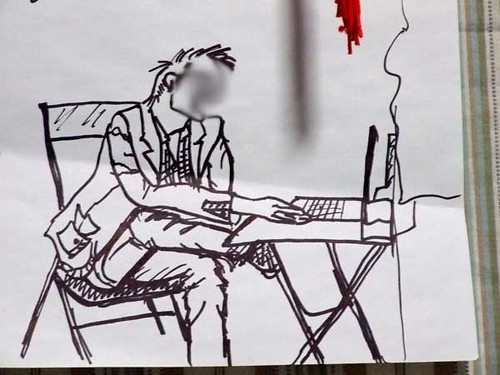Or this will happen to your teeth.
You are currently browsing the monthly archive for February 2009.
Zheng Binbin, or ‘Ben’, took the train to Beijing on September 1st, 2007: the day he graduated from university near his hometown (Lin Fen in Shanxi province). It had been his dream since his final years at college to come to make it big in China’s capital. How do I know this? Well – besides him telling me – his email address begins wodebeijingmeng@… (‘my Beijing dream’).
He lives not far from Beida, in Beijing’s north-west. From his room he runs an online shop for women’s clothing: cheap, good-quality, simple stuff (I’ll put a photo up of one of the many kinds of sweater he sells soon). His ‘shop’ is called Beijing Chuan Shuo and you can find it by searching on Tao Bao.
Ben’s business has been doing rather well; he certainly seems very busy, and works his mobile a lot, whenever I see him. The cold Beijing winter helped, with girls looking to pad up without dishing out. In an average day, he sells fifty to eighty clothes, earning a tidy 500 kuai (£50) profit. 100 kuai of this, as of last month, goes each day to his first employee … his sister.
He hopes to expand this business someday or start a new company … as he told me, “I have my dream, but right now it is too far away from me”.
This is the fourth of six posts introducing the six ‘heros and heroines’ (and sometimes villains?) of this blog.
Mary, from Dalian, is in the final year of her master’s degree in Mining Spatial Information and Subsidence Engineering at a technical university in north-west Beijing. To give an idea of just how over-my-head her subject flies, her Bachelor’s thesis was titled “The Monitoring and Evaluation of Ecological Damage Based on Remote Sensing in Typical Mining in Mentougou District”.
She is also a Christian – among the already large, and rapidly growing, number of converts in China. It’s a number which proves difficult to pin down: somewhere around the 50 million mark is a good bet.
Mary keeps herself busy: besides her rigourous studies, she tutors Mandarin, volunteered on a charity camp in Yunnan this winter break (more on this to come) and is applying for a competitive PhD spot in foreign universities in the US and Finland. I wonder sometimes if it all gets on top of her.
In this picture, Matilda is ice-skating on the ‘no name’ lake in Beida (Peking University – Beida is an abbreviation of the Chinese equivalent ‘Beijing Daxue’). She is in her first postgraduate year there, studying Chinese language and linguistics – her ambition is to teach Mandarin. She certainly does a good job correcting my more embarrassing mistakes.
Students at Beida and its neighbour Tsinghua (Hu Jintao’s alma-mater) really are the cream of the crop. The stats change from place to place and time to time, but roughly 1 in 10,000 students in any given province score high enough on their gao kao (the insanely pressured be-all-and-end-all exam at the end of high school) to go there. Terrifying.
Matilda (true to her namesake?) is a big Chomsky fan, and recently recommended to me Kant’s ‘Observations on the Feeling of the Beautiful and Sublime’ (‘Des Suhonen und Erbabenen’), which proposes a theory of climate influencing personality. Also terrifying.
UPDATE: Since writing this opening post, I’ve decided not to follow Thomas on this blog. This is for a variety of reasons, chief of which is the fact that Thomas and I are a thousand miles away. Too far for us to keep in the kind of regular touch which I would need to write accurately about his life and what he is feeling as he lives it.
For Thomas has lived – and I’m sure will continue to live – a fascinating life. Three months ago, he was working as a scribe in a wood printing office near the Potala Palace in Lhasa: he was paid 0.5 RMB for one word, writing almost 400 words a day. Now he is a cofounder of a French language teaching school in Xining: he doesn’t speak a word of French.
Another reason not to write is that should the situation arise that in talking about Thomas I am talking about Tibet, I put him at risk. Anonymity always has its chinks, and a 1% risk is occasionally one you really shouldn’t take. Under these circumstances, I choose silence over self-censorship.
___
Thomas, 27, is a Tibetan from eastern Qinghai, one of China’s most westerly – and stunning – provinces. I have known him since the summer of 2007, when I taught English in the middle school of his village. As with William and Mary, I will be keeping Thomas anonymous on this blog.
Thomas has just finished teaching English to nearly a hundred children in the grasslands south of Qinghai lake, not far from the town Gonghe. Every winter, the grasslands community organises a local holiday school for a couple of weeks, inviting a teacher and paying him keep plus whatever is left over from their funding pot when the lessons are over. Thomas was this year’s teacher: no doubt he passed on to his pupils the same enthusiasm (and grammar mistakes) with which he lives his own life.
A friend and I visited this school a fortnight ago, and Thomas invited us – with all of three minutes notice – to teach his students for an hour. From this I offer a warning: don’t give out sweets unless you’ve got enough for all … and an inspiration: almost a hundred students CAN fit into one small classroom.
Thomas has studied and painted Tangkas (the traditional Tibetan art form, depicting symbolic Buddhist scenes) since he was a kid. Here is one he painted last year:
My next six posts will briefly introduce six characters this blog will follow in the coming months – young Chinese in a new China.
William is 23, born in Anhui – one of China’s poorest provinces. It was in 2004 that he came to Beijing to study Food Science at one of the plethora of little-known technical universities here. (You can’t walk a block with your eyes closed without finding a university in Beijing’s northwesterly Haidian district.) Three years later he dropped out. In his own words:
I don’t like education in school. It’s not free. You must learn political communism, the ideas of CCP, and must do what your teacher tells you. You can’t do what you want to do. … I want to live my life, not another life, so I do what I want to do. I want to listen to my heart*.
William now works for an environmental website, as the assistant of one of its editors – writing daily newsletters, accounting, organising name cards for events. He works eight hours a day, from 7:30am to 4:30pm … but most days stays on until 6 or later. This summer he will leave his job and hopes to finish his final year at his old college. His dream after then? To study natural sciences at Beida, and begin working for an NGO.
I’ve smudged William’s face in the picture here (a sketch of him surfing the net, by his girlfriend), as he’s asked to remain anonymous.
___
* When I quote my conversations with William, I will clean up his English to make it grammatical, but of course not change the meaning or his choice of words. Other quotes will be my translations from Mandarin.

